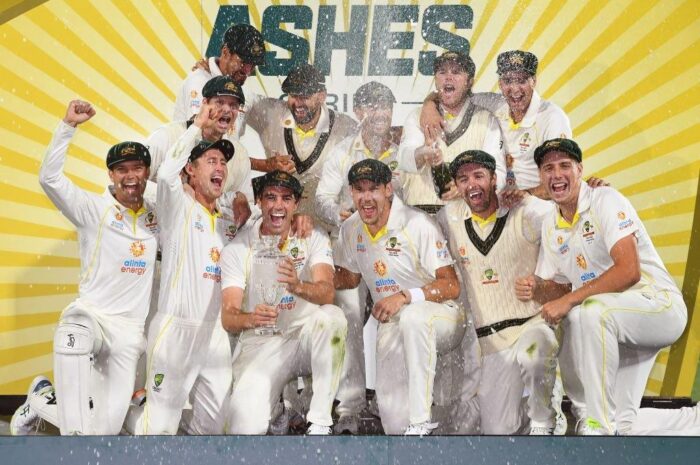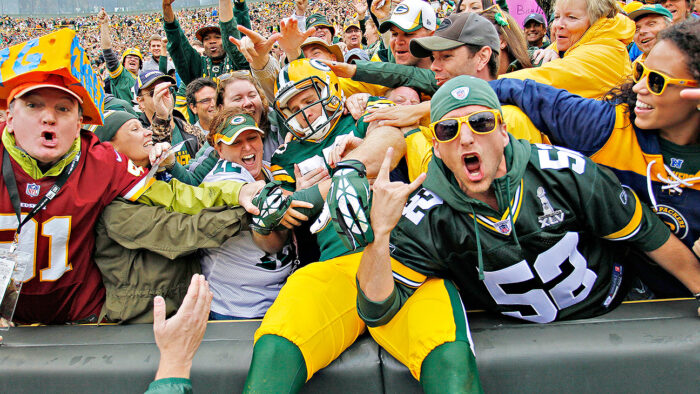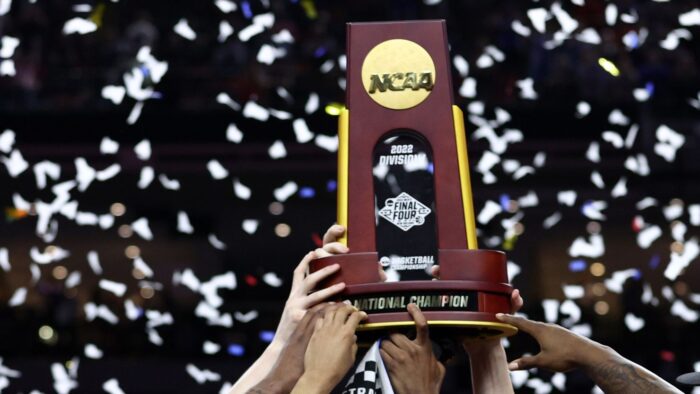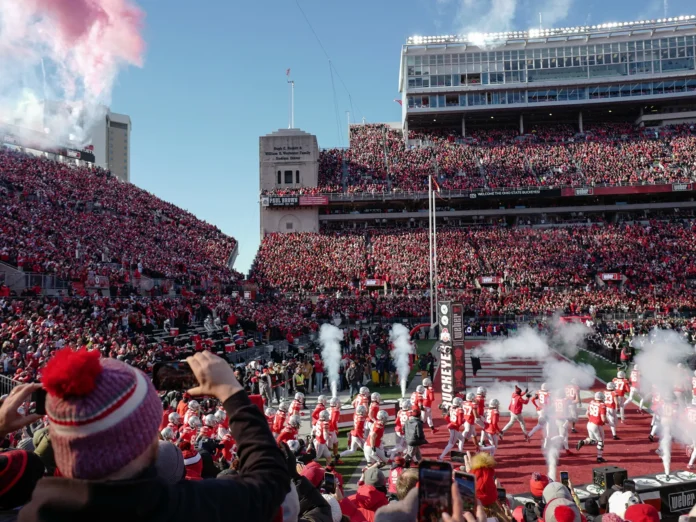Some things in sports just go beyond points, scores, or trophies. They’re the kind of traditions that outlive players and outlast eras – stories passed down like family recipes, rituals repeated generation after generation, moments that don’t need explaining because lifelong sports fans just know.
These customs are what give sports their soul and keep the fans coming back – year after year, season after season.
They also serve a deeper function: uniting fans who’ve never met, connecting them/us to places we’ve never been, and turning casual observers into lifelong devotees. Let’s see them now!
1. The Ashes ─ A Cricket Rivalry Rooted in History
Let’s talk about one of the oldest and most iconic sports traditions: The Ashes. This is more than just a test cricket series – it’s practically a religious event for fans in England and Australia. Born in 1882 after England’s shocking loss to Australia at The Oval, the series was dubbed “the death of English cricket,” and someone mockingly stated that its ashes would be taken to Australia.
Now? Every two years, the nations battle it out for a tiny urn that holds symbolic “ashes” – and the bragging rights of an entire Commonwealth.
Fans don’t just watch The Ashes; they live it. And if you want to really feel the pulse of this historic event – or place a smart wager while at it – you can track all the action, odds, and updates on Betway, a hub that gets as hyped for the rivalry as the fans do.

2. College Football Saturdays in the U.S.
In America, few traditions are more sacred than college football on a crisp Saturday in the fall. We’re talking tailgates that start at dawn, fight songs sung off-key, painted faces, and packed stadiums in towns that practically shut down on game day.
What makes this tradition bigger than the game is its scale and loyalty. Alumni travel cross-country. Families pass down season tickets like heirlooms. And rivalries like Michigan vs. Ohio State or Alabama vs. Auburn feel more like ancient feuds than just football games.
It’s not just who wins. It’s what it means.
3. The All Blacks Haka
Before the New Zealand rugby team – the All Blacks – even touches the ball, they’ve already won part of the psychological battle. Why? The Haka.
This powerful Māori war dance is performed before each match. It’s a declaration of intent, respect, and identity. The entire team lines up, chanting and stomping in unison, staring down their opponents. And you feel it – whether you’re in the stadium or watching from your couch.
This tradition doesn’t just honor Māori culture; it reminds the world that rugby, for the All Blacks, is a legacy built on pride, unity, and history.
https://www.youtube.com/watch?v=O-LEcWpQzY8
4. The Boston Red Sox and the Curse of the Bambino
Some sports traditions are born out of heartbreak.
Take the Boston Red Sox. After selling Babe Ruth (aka “The Bambino”) to the New York Yankees in 1919, the team went 86 years without a championship, a drought famously attributed to the “Curse of the Bambino.”
Fans clung to this narrative – passed through generations – until 2004, when the Sox finally broke the curse in dramatic fashion. The tradition of believing in the curse, talking about it, and rallying around it became a story that defined the team more than any stat sheet could.
Even now, “The Curse” is part of the lore.
5. Green Bay Packers and the Lambeau Leap
In a league full of corporate stadiums and billion-dollar franchises, the Green Bay Packers stand out – partly because they’re the only team owned by their fans, but also because of the Lambeau Leap.
After a touchdown at Lambeau Field, Packers players traditionally jump into the stands to celebrate with the fans. It’s pure, it’s electric, and it blurs the line between spectator and athlete.
It’s not a PR stunt. It’s a rite of passage.

6. Wimbledon’s White Dress Code
Wimbledon is the oldest tennis tournament in the world, and it wears that history with pride. One of its most enduring and often debated traditions is the all-white dress code for players.
It’s not just about appearance – it’s about upholding tradition, prestige, and consistency. Players can bend the rules at other Grand Slams, but not here. The white outfits are a symbol of tennis at its most classic.
Love it or hate it, Wimbledon’s dress code keeps the tournament rooted in its Victorian origins.
7. Soccer Chants ─ The Soundtrack of Football
In soccer stadiums across the world, the atmosphere is shaped less by the scoreboard and more by the voices in the stands. These aren’t just chants – they’re battle cries, lullabies, anthems. They’re how fans talk to the players, each other, and even to rival clubs.
Why chants matter:
- They tell stories of triumph and heartbreak
- They unite tens of thousands into one collective voice
- They often include humor, irony, and sharp wit
- They keep the energy alive, even when the team is losing
Walk into Anfield and hear “You’ll Never Walk Alone,” and it hits you – you’re not just in a stadium; you’re part of a living tradition. In Argentina, Boca Juniors fans are known to create seismic-level vibrations with their singing. In Germany, Dortmund’s “Yellow Wall” doesn’t just watch – it roars.
“When 60,000 people sing in sync, it feels like you’re part of something ancient.”
Even newcomers feel it instantly: chanting isn’t just noise. It’s belonging.
8. The Super Bowl Halftime Show
Not every sports tradition is athlete-driven – some have become cultural phenomena in their own right. The Super Bowl Halftime Show is the perfect example. What started as a modest break in a football game is now a global spectacle watched by over 100 million people.
Over the years, it’s featured performances from the likes of Prince, Beyoncé, and U2. In many homes, the halftime show is the main event. It’s where sports meets pop culture, where wardrobe malfunctions become historic moments, and where artists get a platform unlike any other.
The game might crown the champions, but the show often steals the headlines.
9. March Madness and the Bracket Obsession
In the U.S., March Madness – the NCAA Men’s Basketball Tournament – is another prime example of a tradition that takes on a life of its own. Sure, the games are intense, but it’s the brackets that dominate offices, friend groups, and online communities.
Every march:
- People with zero basketball knowledge fill out brackets
- Upsets destroy “perfect bracket” dreams by Round 1
- Even non-fans become emotionally invested in a Cinderella story
It’s chaotic. It’s beautiful. And it’s uniquely American.
What’s wild is that nobody has to participate. Yet we do, because it feels like a collective event that transcends sport. The moment Selection Sunday happens, everyone’s suddenly a bracketologist.

Final Thoughts ─ More Than Just the Game
When people say they love sports, often what they really mean is they love what surrounds it – the rituals, the drama, the community, the weird little traditions that seem absurd out of context but feel sacred when you’re part of it.
These traditions – whether they’re tied to geography, culture, or fanbase – are what make sports unforgettable. You might not remember every final score, but you’ll never forget the feeling of being part of something bigger than yourself.
And that? That’s the real win.
FAQs About Iconic Sports Traditions
-
What are some lesser-known old sports traditions still alive today?
While most fans know about The Ashes or Wimbledon, some traditions fly under the radar. Baseball’s ceremonial first pitch, which began in 1910 with President Taft, continues before every MLB game. In college sports, homecoming games and midnight madness rituals are traditions that bond students, alumni, and local communities. Even sumo wrestling ceremonies in Japan follow ancient Shinto customs that have been preserved for centuries.
-
Do fans create their own traditions?
Absolutely. Many of the most beloved chants, game-day rituals, or even tailgate meals come straight from passionate fans – not organizations.
-
Are sports traditions the same across countries?
Not even close. In some places, silence is respectful. In others, it’s all about noise, color, and choreography. Traditions reflect the culture they come from.
-
Has the commercialization of sports hurt these traditions?
In some cases, yes. Certain traditions have been watered down for TV or sponsors. But many survive – or even thrive – because fans protect them fiercely.
-
Can new traditions still form today?
Definitely. Just look at how fast things like the Lambeau Leap or March Madness brackets have become engrained. If it brings people together and sticks, it becomes tradition.

